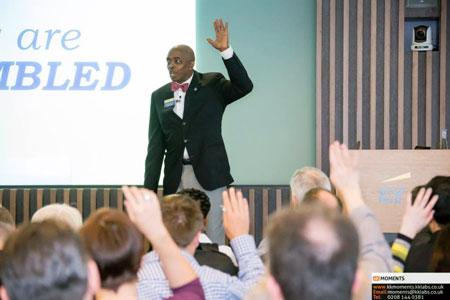Our stories are personal; our stories are powerful; sometimes our stories are PAINFUL. Some time ago, while discussing storytelling during a panel discussion, I made a comment about telling stories from THE DARK PLACE…a place of deep pain and raw emotions. My good friend the 1999 World Champ Craig Valentine says, “A message is really just a MESS with AGE” and Legendary comedienne Carol Burnett said “Comedy is pain plus time”. While I don’t necessarily disagree with either statement, I have to acknowledge that for some, the AGE and the TIME in both quotations may come too quickly. That sounds a bit vague; I get it; so let me clarify.
Sometimes, speakers desire so deeply to touch their audience, to MOVE their audience, that they use a story from their painful past…from their DARK PLACE…but without having allowed themselves enough time to heal BEFORE they share it. Such a mistake can be emotionally devastating, especially if audience members who empathize or who can relate to the pain come forward to share their stories and commiserate. As well-intentioned as the sharing of the story may be, the very act of sharing can re-open a wound and resurrect painful emotions.
Now I need to be honest. For some, the very act of going to the dark place brings healing, but you have to be sure…doubly sure, that it won’t be harmful to you. You have to make sure that you can find your way back. I witnessed an example of this at the 2010 World Championship of Public Speaking. David Henderson, the winner of that contest, took the audience on an emotional journey that was at times painful. The very telling of his story stirred his own emotions, and he unashamedly cried during his speech. He didn’t do it to tug at the audience’s heart strings. He didn’t do it to manipulate the audience. His tears and his emotions were genuine, and they were both appropriate and understandable int he context of his presentation. Most importantly, despite the obvious display of emotion, David was fully in control. At no time did it seem that he was seeking redemption, forgiveness, sympathy or validation from the audience. Nor did it appear that he was looking for answers, searching for a way to rid himself of any guilt, or appealing for comfort and consolation. There was no need for him to heed the wise words of my friend and fellow professional speaker Ed Tate who said, “Don’t use the platform for therapy!”
There is something else to consider: the impact your dark place story can have on your AUDIENCE. David and I have spoken several times since he delivered that speech, and he made an interesting observation that made me realize that not being able to return from the dark place can have a dual negative impact. He said, “If you go to the dark place and leave the audience there, they will likely hold it against you.” And Ironically, the more successful you are at going to the dark place, the greater your risk of offending your audience. Effective stories can certainly elicit emotions, but they don’t rip into the audience’s emotions. That was a bit harsh…I know, but if the audience is left on a low, that’s exactly how some of them may feel…LOW. So what am I suggesting? William Shakespeare wrote, “To thine own self be true, and it must follow as the night the day, thou canst not then be false to any man.” Simply put…BE HONEST WITH YOURSELF. BRUTALLY HONEST. If you know that you shouldn’t go to the dark place…don’t. It can be a double-edged sword. Going to the dark place before the right time can affect BOTH you the speaker, and your audience. Here’s a thought for your consideration: You don’t have to go to the DARK PLACE to speak with power and impact. I have often said that your story doesn’t have to be sensational, it just has to be sincere. Your experience is almost certainly vast enough to touch your audience without causing emotional turmoil. Please don’t misunderstand me. I’m not asking you to remove emotional content. I said emotional TURMOIL.
Words are weighty. As speakers, we wield tremendous power…the power to mold and manipulate the emotions of our audiences…and that’s a tremendous responsibility. If by going to the dark place too soon we can throw our own emotions into a tailspin, imagine what that might do so some in our audience. Here’s my closing thought: If you are confident that going to the DARK PLACE will not harm you, but will help your audience, feel free to take the audience with you.
Just be sure that you can find your way back. If you can, then by all means…TELL YOUR STORY!

STORY Q & A
Q. If I try to replace all the narration in my speech with dialog, it feels like I’m acting. What should I do?
A. Although I advocate using dialog to re-live an experience, I don’t expect or advise that an ENTIRE speech be delivered in dialog. Balance is necessary and narration comprises most stories. Consider delivering the MOST POIGNANT scenes in dialog and keeping them short and sweet. For example, you could be in a scene where someone confronts another for starting rumors.
It COULD be, “I’m so angry at you right now!” “Why? What did I do?” “Don’t pretend that you don’t know!” “I have NO IDEA what you’re talking about!” “You KNOW it was you! You started that awful rumor about me!” “What rumor?” “The one about me cheating on that final exam!” “Wait! That wasn’t me! I am just as shocked as you are. Somebody else started that! We have been friends for 17 years and I would NEVER do that to you!” “Well who started it then?”
I could go on, but I won’t.
Consider instead, “I was so angry that I confronted her. ‘How could you tell everyone that I cheated on my final exam?’ She looked me dead in the face and said, ‘We have been friends for 17 years. I would NEVER do that!”
In this second example, the dialog is reduced to include the most SIGNIFICANT exchanges. Simply put, focus on dialog to recreate conversations, and keep them ‘tight’. Narration in NECESSARY.

STORY IDEA
DEBRIEF THE DAY. At the end of your day, reflect on your experiences, conversations and observations. Recall your sensory responses (what you saw, heard, touched, tasted & smelled) and your emotional reactions. Perhaps your day began with the WORST cup of coffee you have ever tasted. How did that affect your morning? Your entire day? Sometimes the simplest of experiences provide material for interesting stories. Write them down or record them. Use your mobile device, a folder on your tablet or computer, or recall the story on a digital recording device. You can even record a little reminder video that you can then work on later. Don’t lose those moments; use them to create memories. They will help you to TELL YOUR STORY!


Mark, this post came at the right time. I was told devasting news yesterday when researching for a speech that I was going to do about my sister. I see this post as God telling me that I need to heal first and then seek His direction on whether I need to share this or not in a speech. Thank you for the suggestions and thank you also for the idea to capture my stories. I did your suggestion today. You are right…there is real meat to chew on if one is mindful!
TRUE! TRUE! TRUE! When I started in Toastmasters I used it as a healing platform. I would have the audience in tears, as I told stories of my life. One person told me to don’t leave them down take them out because she was crying so much that she couldn’t get out. I still use Toastmasters as a healing place, somehow I have managed to add humor – I do not consider myself to be funny. It just happens.